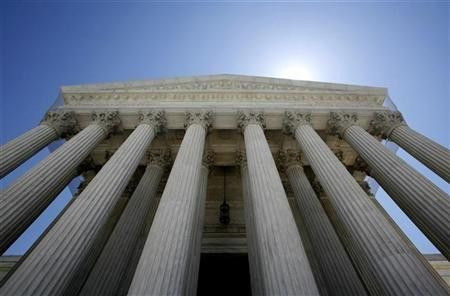Supreme Court's Top Five Rulings This Term That Affect Businesses

The U.S. Supreme Court's decisions this term on cases directly concerning businesses have been largely favorable to corporations.
Many of those decisions have been signed by a broad majority of the justices rather than a narrow majority. To date, the high court has decided 28 cases, and only six have been signed by a 5-4 majority, according the National Litigation Chamber Center, an arm of the Chamber of Commerce.
Here are summaries of five key decisions from the Supreme Court this term that affect businesses.
American Tradition Partnership v. Bullock -- The high court this week upheld, 5-4, its 2010 Citizens United v. Federal Election Commission decision that essentially allows unions and corporations to make political expenditures. The court did so by reversing a Montana Supreme Court decision upholding a state law restricting independent political expenditures by corporations. The Supreme Court said the state court's decision violated the First Amendment rights that underlie Citizens United v. Federal Election Commission, which the court said applies to state and local elections as well as federal elections. The outcome was a victory for business because it allows businesses to continue asserting their interests in the political process.
Knox v. SEIU -- The court decided, 7-2, that the Service Employees International Union could not force non-members who had not previously opted out of paying dues for political activities to pay a special assessment for the SEIU's effort to defeat two referenda in California. Among liberal justices, Ruth Bader Ginsberg and Sonia Sotomayor ruled against the union. The outcome was a victory for business interests because it limits the ability of unions to use, unilaterally, employee money to oppose employer policies.
Southern Union Co. v. United States -- The court decided, 6-3, that the Sixth Amendment entitles criminal defendants the right to have any fact that increases criminal fines beyond a statutory limit submitted to a jury. The case arose out of a $38.1 million penalty for Southern Union's allegedly improper storing of mercury. The outcome was a victory for business interests because it, effectively, creates an obstacle to increasing financial punishment of businesses.
Christopher v. SmithKline Beecham d/b/a GlaxoSmithKline -- The court decided, 5-4, that pharmaceutical sales representatives are exempt from overtime pay under the Fair Labor Standards Act. The decision overturned a ruling by the Ninth Circuit that ruled in favor of the Labor Department's new policy of granting such sales representatives overtime pay. The Department's new interpretation of its own regulations contradicts nearly 70 years of settled agency precedent, the National Chamber Litigation Center said in a statement. The outcome was a victory for business interests because it helps limit costs.
Ticketmaster v. Stearns -- The Supreme Court declined to consider a case from the Ninth Circuit Court that businesses had wanted overturned. The case arose from claims that Ticketmaster advertising had induced customers to buy services they did not want. The San Francisco court held that customers who suffered no injury in fact could be included as plaintiffs, even though those persons would have had no standing to sue Ticketmaster regarding this matter in federal court. The outcome was a defeat for business interests because it increases the pool of people who can participate in class action suits against businesses.
© Copyright IBTimes 2024. All rights reserved.






















